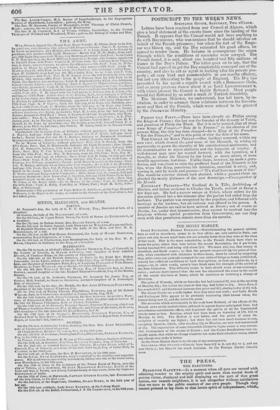PIIIL1P THE FIRST.—There have been already six Philips among the
Kings of France : the last was the founder of the dynasty of Valois, and grandson of Philip the Third. But it is to be noticed, that all these were Kings of France—" Rois de la France:" in the election of the present King, the title has been changed—he is King of the Fe-each- " Roi des Francais ;" and in this point of view the first of his name. TIlE CouuT or KING PIIILIP.—One incident occurred, within my own view, which showed the good sense of the Monarch, in seizing an opportunity to prove the sincerity of his constitutional sentiments, and his determination to reject adulation and the fopperies of royalty. A well-dressed man near me started forward, with the intention, as I thought, to shake his Majesty by the hand, as many others, of more humble appearance, had done. Unlike them, however, he made a genu- flexion, and was about to raise the proffered hand of the Monarch; to his lips, when the King, perceiving his intention, snatched it away, and, waving it, said by words and gesture—" lire shall have no more of this." The would-be courtier shrunk back abashed, while a general cheer ap- plauded the manly plainness of the new &were:gm—Correspondent of the Herald.
EMIGRANT PairtsTs.—The Cardinal de la Tille, Archbishop of Rheims, and father confessor to Charles the Tenth, arrived at Dover a few days ago. He had a narrow escape at Calais, where orders for his detention arrived but a few minutes after the packet had sailed from the harbour. The prelate was recognized by the populace, and followed with hootings to the harbour, but no violence was offered to his person. A number of Jesuits are said to have arrived at Dover; not of course as .Tesuits, for, under that denomination, they cannot be received into the kingdom without special permission from Government, nor can they even with that permission remain more than six months.


























 Previous page
Previous page